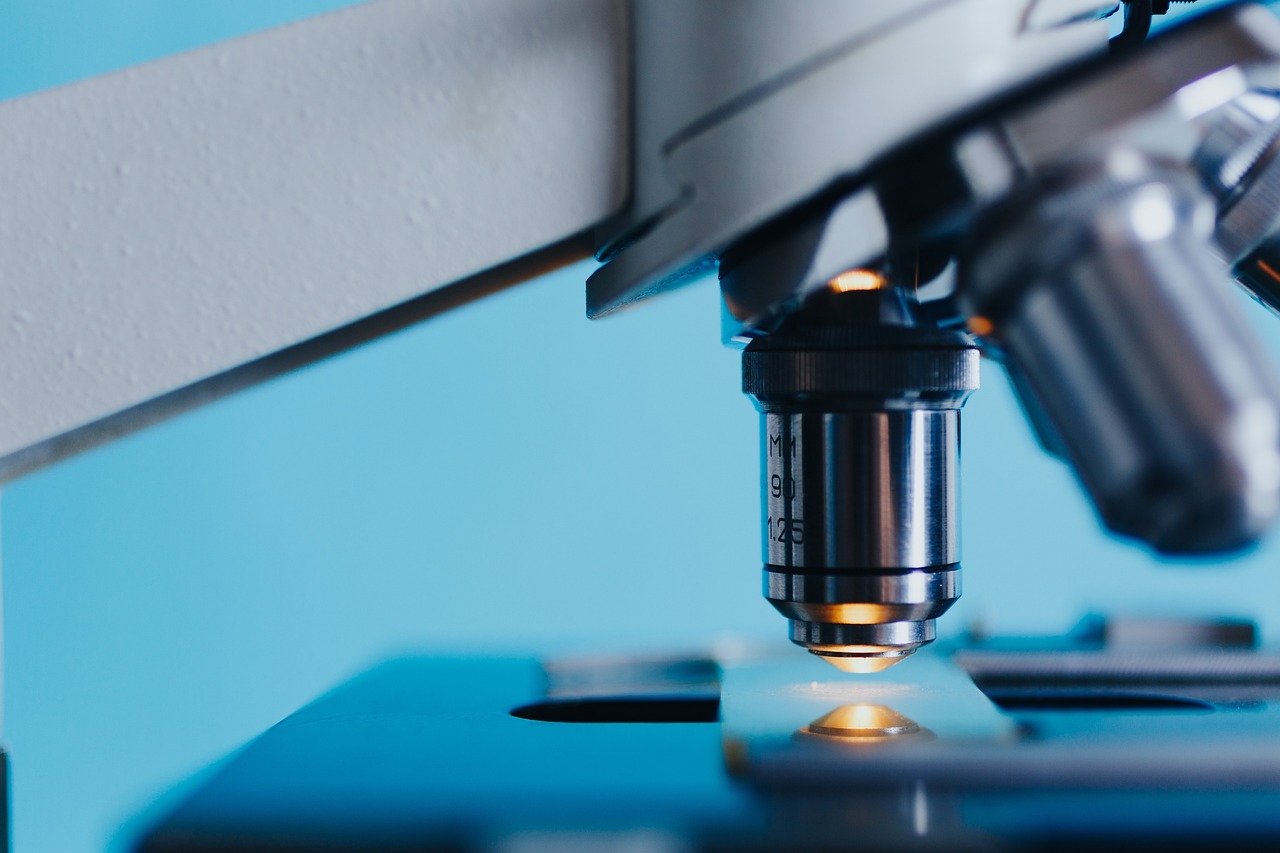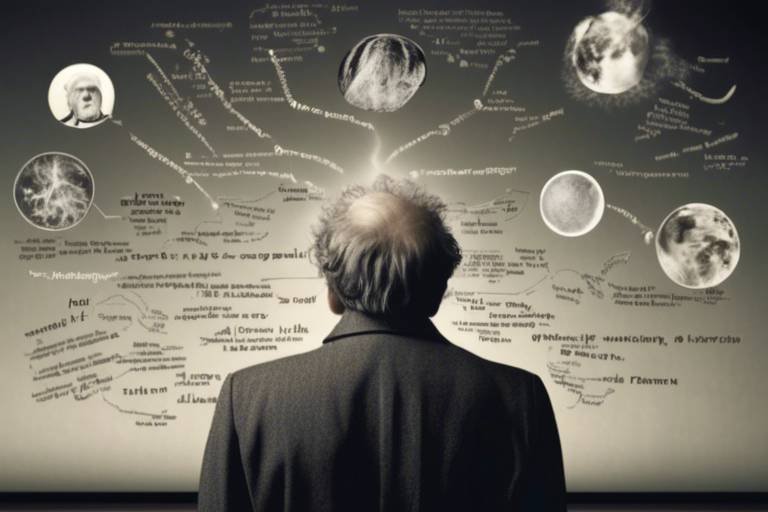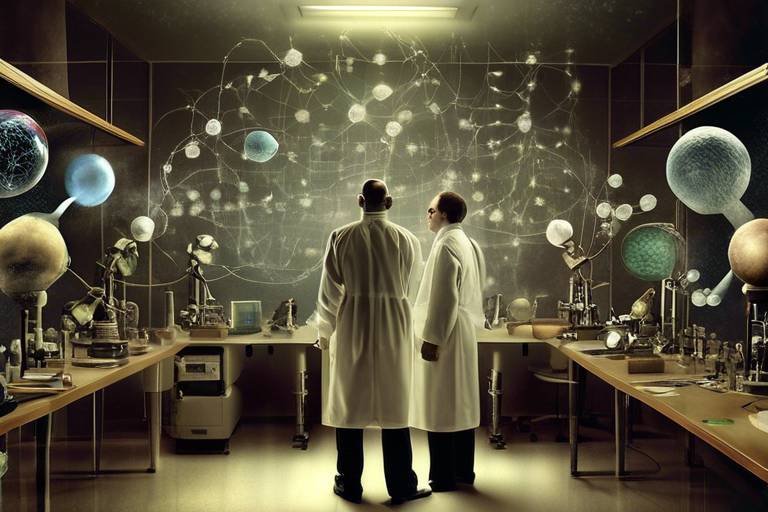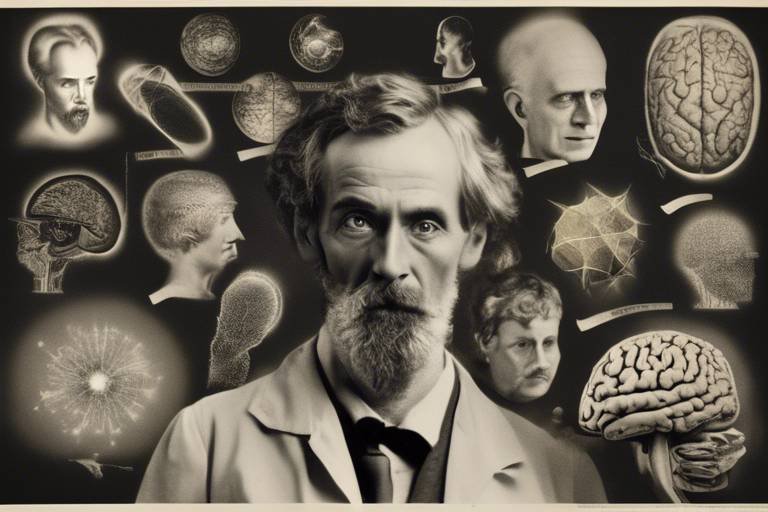Moral Judgments in Science - Who Decides What’s Right?
The intersection of morality and science is a complex and often contentious arena. As scientific inquiry advances, the question of who gets to decide what is considered ethical becomes increasingly critical. In an age where innovations can dramatically alter human lives, the stakes are high. Are we prepared to tackle the moral implications of our discoveries? This article explores the intricate web of influences, implications, and responsibilities that shape moral judgments in the scientific community.
At the heart of this discussion is the role of ethics committees, which serve as the gatekeepers of ethical standards. These committees are composed of diverse members who bring various perspectives to the table, ensuring that research practices are scrutinized and aligned with established ethical norms. But what happens when these norms clash with cultural values or personal beliefs? The decisions made by these committees can significantly impact the trajectory of scientific inquiry, sometimes leading to groundbreaking advancements or, conversely, to stagnation in research.
Furthermore, cultural perspectives play a pivotal role in shaping moral judgments in science. Different societies may interpret ethical principles through their unique lenses, leading to a rich tapestry of moral frameworks. For instance, a practice deemed acceptable in one culture might be viewed as unethical in another. This disparity raises important questions about how to foster global collaboration and respect in scientific endeavors. How do we reconcile these differences while advancing knowledge? Understanding these cultural influences is essential for creating a cohesive approach to ethics in science.
One way to delve deeper into this topic is by examining case studies that illustrate ethical dilemmas faced by researchers. For instance, consider a scenario where a scientist discovers a potential cure for a disease but must conduct trials on vulnerable populations. The ethical implications are profound. Should the potential benefits outweigh the risks? Such dilemmas highlight the challenges researchers encounter when navigating the murky waters of moral judgment.
The historical context of ethical standards also provides valuable insights into contemporary practices. Over the years, scientific communities have learned from past mistakes, leading to the establishment of more robust ethical guidelines. For example, the infamous Tuskegee Syphilis Study serves as a cautionary tale, reminding us of the importance of informed consent and the need for transparency in research. By exploring the evolution of these standards, we can better understand the expectations for moral conduct in today's scientific landscape.
As we move forward, the rapid advancement of technology brings forth a new set of ethical challenges. Emerging technologies, such as artificial intelligence and genetic engineering, require ongoing dialogue and adaptation of our moral frameworks. How do we ensure responsible innovation while addressing the potential risks involved? The answer lies in a collaborative approach that involves scientists, ethicists, and the public alike in discussions about the implications of these technologies.
Public perception and trust in science are heavily influenced by perceived ethical standards. When moral judgments are made transparently, the public is more likely to trust scientific endeavors. Conversely, scandals or ethical breaches can lead to skepticism and distrust. Scientists must be adept at communicating their work and the ethical considerations that accompany it. This not only helps in building trust but also fosters a culture of accountability and responsibility in scientific research.
Regulatory frameworks and guidelines established by governing bodies play a crucial role in ensuring that ethical standards are upheld in scientific practices. These frameworks aim to strike a balance between fostering innovation and maintaining ethical responsibility. By examining these regulations, we can gain insights into how they shape research and development, ultimately guiding the scientific community toward responsible practices.
Accountability mechanisms are essential for maintaining ethical standards in scientific research. They ensure that researchers adhere to established guidelines and are held responsible for their actions. This accountability fosters a culture of integrity, where researchers are encouraged to act in the best interests of society. After all, the ultimate goal of science is to improve human life, and ethical conduct is paramount in achieving that objective.
Looking ahead, the future directions for ethical science will undoubtedly evolve as new challenges arise. As we navigate the complexities of moral judgments in an ever-changing landscape, it is essential to remain adaptable and open to revising our ethical frameworks. By fostering an environment of continuous dialogue and reflection, we can ensure that science remains a force for good in society.
- What is the role of ethics committees in scientific research? Ethics committees review research proposals to ensure they comply with ethical standards and protect the rights of participants.
- How do cultural perspectives influence moral judgments in science? Cultural backgrounds can shape interpretations of ethical principles, leading to diverse views on what is considered acceptable in scientific practices.
- Why is public trust important in science? Public trust enhances the credibility of scientific research and encourages collaboration between scientists and the community.
- What are some emerging ethical challenges in technology? Emerging technologies like AI and genetic engineering pose new ethical dilemmas that require ongoing dialogue and adaptation of moral frameworks.
- How can accountability be ensured in scientific research? Accountability mechanisms, such as peer review and regulatory oversight, help maintain ethical standards and hold researchers responsible for their actions.

The Role of Ethics Committees
Ethics committees are the unsung heroes of the scientific world. They serve as the guardians of moral integrity, ensuring that research is conducted in a way that is not only scientifically sound but also ethically responsible. Imagine a ship navigating through treacherous waters; ethics committees are like the lighthouse guiding researchers away from the rocky shores of ethical violations. Their primary responsibility is to review research proposals, assess potential risks, and evaluate the ethical implications of studies involving human or animal subjects.
These committees comprise a diverse group of individuals, including scientists, ethicists, legal experts, and community representatives. This diversity is crucial because it brings multiple perspectives to the table, fostering a more comprehensive understanding of ethical issues. For instance, a medical research study might raise different ethical concerns than an environmental study, and having a well-rounded committee helps address these unique challenges effectively.
One of the key functions of ethics committees is to ensure that informed consent is obtained from participants. This means that individuals involved in research should fully understand what they are consenting to, including any potential risks and benefits. It’s not just about ticking a box; it’s about respecting the autonomy of participants and ensuring they are treated with dignity. In this way, ethics committees play a vital role in building trust between researchers and the communities they serve.
Moreover, ethics committees are not static; they evolve alongside scientific advancements. As new technologies emerge, such as genetic editing or artificial intelligence, these committees must adapt their guidelines to address the unique ethical dilemmas posed by these innovations. For example, the ethical considerations surrounding CRISPR technology are vastly different from those of traditional genetic research. Thus, ethics committees must engage in ongoing education and dialogue to stay relevant and effective.
To illustrate the impact of ethics committees, consider a recent study involving a new drug trial. The committee meticulously reviewed the research proposal, identifying potential risks that the researchers had overlooked. By doing so, they not only protected the participants but also enhanced the credibility of the research. This example underscores the importance of having a robust ethical framework in place, as it can significantly influence the direction and integrity of scientific inquiry.
In summary, ethics committees are essential in the scientific landscape, serving as a crucial checkpoint for research practices. They ensure that ethical standards are upheld, protect the rights of participants, and adapt to the ever-changing technological landscape. As we move forward, the role of these committees will continue to be vital in maintaining the delicate balance between scientific innovation and ethical responsibility.

Influence of Cultural Perspectives
The world is a vibrant tapestry of cultures, each with its own unique set of values, beliefs, and moral frameworks. When it comes to science, these cultural perspectives significantly influence how ethical standards are perceived and applied. Imagine a scientific issue as a complex puzzle; the pieces are shaped by the cultural backgrounds of those involved in the research. This diversity can lead to a rich exchange of ideas, but it can also create significant challenges. For instance, what is considered ethical in one culture might be viewed differently in another. This divergence can lead to misunderstandings and conflicts, particularly in international collaborations.
One striking example is the debate surrounding genetic research. In some cultures, modifying genetic material is seen as a groundbreaking opportunity to eradicate diseases, while in others, it may be viewed as playing God. This stark contrast illustrates how cultural beliefs shape moral judgments and ethical considerations in scientific practices. Researchers must navigate these waters carefully, ensuring that they respect cultural sensitivities while pursuing innovative solutions.
Furthermore, cultural perspectives can also dictate the prioritization of research topics. For example, in regions heavily impacted by infectious diseases, research funding may heavily favor studies on vaccines and treatments for those specific illnesses. Conversely, in wealthier nations, there might be a greater focus on chronic conditions or lifestyle diseases. This disparity can lead to an imbalance in scientific progress, where the needs of certain populations are overlooked because of cultural biases in funding and research agendas.
To better understand the influence of cultural perspectives on moral judgments in science, let's consider the following table that summarizes key factors:
| Cultural Factor | Influence on Moral Judgment |
|---|---|
| Religious Beliefs | Can shape views on topics like stem cell research and cloning. |
| Historical Context | Past experiences with scientific practices can influence current ethical standards. |
| Social Norms | Community values can dictate what is considered acceptable in research. |
| Economic Factors | Wealth disparities can affect access to scientific advancements and ethical considerations. |
In conclusion, understanding the influence of cultural perspectives on moral judgments in science is essential for fostering collaboration and respect among researchers from diverse backgrounds. It encourages a more inclusive approach to scientific inquiry, where various viewpoints are considered, leading to a more holistic understanding of ethical standards. As we move forward, embracing this diversity will not only enrich scientific discourse but also enhance the integrity of research practices globally.
- How do cultural perspectives shape scientific ethics? Cultural perspectives influence the interpretation of ethical standards, leading to diverse moral judgments in scientific practices.
- Can cultural differences lead to conflicts in international research? Yes, differing cultural views on ethics can create misunderstandings and conflicts during international collaborations.
- Why is it important to consider cultural perspectives in science? Considering cultural perspectives fosters respect and collaboration, ensuring that diverse viewpoints are included in scientific inquiry.

Case Studies in Ethical Dilemmas
When we talk about ethical dilemmas in science, we often think of the big headlines—those jaw-dropping cases that make us question the very foundation of scientific integrity. But what does this really mean in practice? Let’s delve into some compelling case studies that illustrate the tough choices scientists face and the moral judgments that come into play.
One notable example is the infamous Tuskegee Syphilis Study, which ran from 1932 to 1972. In this study, researchers observed the natural progression of untreated syphilis in African American males without their informed consent. The ethical breach here is staggering. Imagine being part of a study where you’re not told the truth about your health condition, all in the name of research! This case not only highlights the importance of informed consent but also raises questions about racial bias and exploitation in scientific research.
Another striking case is the Stanford Prison Experiment conducted by Philip Zimbardo in 1971. This psychological study aimed to explore the effects of perceived power by assigning roles of prisoners and guards to participants. What started as a seemingly harmless experiment quickly escalated into psychological abuse, leading Zimbardo to terminate the study prematurely after only six days. This situation begs the question: at what point does research cross the line from ethical to unethical? The blurred lines in this experiment serve as a cautionary tale about the responsibilities researchers have towards their subjects.
| Case Study | Key Ethical Issues | Lessons Learned |
|---|---|---|
| Tuskegee Syphilis Study | Informed consent, exploitation, racial bias | The necessity of transparency and ethical oversight in research. |
| Stanford Prison Experiment | Psychological harm, role of authority, participant welfare | The importance of monitoring and stopping research that causes harm. |
These examples are not isolated incidents; they reflect broader challenges within the scientific community. Researchers often find themselves in morally ambiguous situations where the pursuit of knowledge clashes with ethical considerations. The decisions made in these moments can have lasting impacts not just on the subjects involved, but on public trust in science as a whole.
As we navigate these complex waters, it's crucial to foster an environment where ethical discussions are encouraged and where researchers can seek guidance without fear of judgment. After all, science is not just about what we discover, but how we conduct ourselves while doing so. The lessons learned from these ethical dilemmas can inform current practices and help establish a more ethically responsible scientific community.
- What is an ethical dilemma in science? An ethical dilemma in science occurs when researchers face a situation where they must choose between competing moral principles, often involving the welfare of participants versus the pursuit of knowledge.
- Why is informed consent important? Informed consent is crucial because it ensures that participants are fully aware of the nature of the study, its risks, and their rights, allowing them to make educated decisions about their involvement.
- How can ethical standards be improved in research? Improving ethical standards can be achieved through better training for researchers, more rigorous oversight by ethics committees, and ongoing dialogue about ethical practices within the scientific community.

Historical Context of Ethical Standards
The evolution of ethical standards in science is a fascinating journey that reflects society's changing values and norms. Historically, the scientific community has undergone significant transformations in how it views and implements ethical practices. From the early days of experimentation, where the focus was primarily on discovery and innovation, to the modern emphasis on ethical responsibility and accountability, the landscape has shifted dramatically. In the past, ethical considerations were often an afterthought, overshadowed by the excitement of new findings and technological advancements. Researchers would sometimes prioritize results over the well-being of subjects or the implications of their work.
One pivotal moment in this evolution was the aftermath of World War II, particularly the Nuremberg Trials, which exposed horrific abuses in medical research. This led to the formulation of the Nuremberg Code in 1947, a set of ethical principles aimed at protecting human subjects in research. This code emphasized the necessity of voluntary consent and the importance of minimizing harm, setting a precedent for future ethical guidelines. The Nuremberg Code laid the groundwork for subsequent documents, such as the Declaration of Helsinki in 1964, which further refined ethical standards in medical research and introduced the concept of risk versus benefit analysis.
As we moved into the late 20th century, the rise of bioethics as a distinct field of study became apparent. This was not just a reaction to past abuses but also a proactive approach to the ethical dilemmas arising from rapid advancements in science and technology. Bioethics began to address issues such as genetic engineering, cloning, and the use of human subjects in research, reflecting a growing awareness of the moral implications of scientific progress. The establishment of ethics committees in research institutions became a standard practice, ensuring that ethical considerations were integrated into the research process from the outset.
Today, ethical standards in science are not only shaped by historical precedents but also by ongoing societal debates about morality, technology, and human rights. For instance, the rise of artificial intelligence and biotechnology has introduced new ethical challenges that require a reevaluation of existing frameworks. The discussions surrounding these technologies often reflect broader cultural values and societal concerns, highlighting the need for a flexible and adaptive approach to ethical standards.
In summary, the historical context of ethical standards in science is a rich tapestry woven from past experiences, societal values, and the ever-evolving landscape of technological advancements. Understanding this context is essential for navigating the complexities of moral judgments in contemporary scientific practices. As we look to the future, it is crucial to learn from history and remain vigilant about the ethical implications of our scientific endeavors.
- What are ethical standards in science? Ethical standards in science refer to the principles and guidelines that govern the conduct of research, ensuring the protection of human subjects, integrity of data, and respect for the environment.
- Why are ethics committees important? Ethics committees are essential as they review research proposals to ensure compliance with ethical standards, protecting the rights and welfare of participants.
- How have historical events influenced ethical standards? Historical events, such as the Nuremberg Trials, have led to the establishment of key ethical guidelines that prioritize human rights and informed consent in research.
- What challenges do emerging technologies pose to ethical standards? Emerging technologies, like AI and genetic engineering, present new ethical dilemmas that require ongoing dialogue and adaptation of existing moral frameworks.

Emerging Technologies and Ethics
The rapid pace of technological advancement is reshaping our world in ways we never thought possible. From artificial intelligence to biotechnology, these innovations are not just changing how we live but also challenging our ethical frameworks. As we dive deeper into this digital age, the question arises: how do we ensure that our moral compass stays intact amidst such rapid change?
One of the most pressing issues is the ethical implications of artificial intelligence (AI). AI systems are increasingly making decisions that affect our daily lives, from hiring processes to medical diagnoses. This raises significant ethical questions: Who is responsible when an AI makes a mistake? How do we ensure that these systems are free from bias? The lack of transparency in AI decision-making processes can lead to a loss of trust, creating a rift between technology and the people it serves.
Moreover, emerging technologies like gene editing through CRISPR technology present their own set of ethical dilemmas. While the potential to eradicate genetic diseases is revolutionary, the ability to alter human DNA raises concerns about designer babies and the unforeseen consequences of genetic modifications. Are we playing God? The debate is ongoing, and as scientists push the boundaries of what's possible, societal implications must be carefully considered.
Another area of concern is the rise of surveillance technologies. With the advent of facial recognition software and tracking systems, the line between security and privacy has blurred. While these technologies can enhance public safety, they can also lead to significant invasions of personal privacy. Questions about consent and the extent of government oversight are at the forefront of discussions surrounding these technologies.
To navigate these complex ethical landscapes, ongoing dialogue among scientists, ethicists, policymakers, and the public is essential. We must develop adaptable moral frameworks that can respond to the unique challenges posed by each new technology. This could include:
- Creating multidisciplinary ethics boards to evaluate the implications of emerging technologies.
- Establishing clear guidelines for the responsible use of AI and genetic editing.
- Encouraging public engagement and education on technological advancements and their ethical ramifications.
In conclusion, as we continue to innovate, it is imperative that we do not lose sight of our ethical responsibilities. The future of technology should not only be about what we can do but also about what we should do. By prioritizing ethical considerations, we can ensure that emerging technologies serve humanity positively and inclusively.
1. What are the main ethical concerns surrounding emerging technologies?
The primary concerns include bias in AI, privacy issues with surveillance technologies, and the implications of gene editing on human genetics.
2. How can we ensure ethical practices in technology development?
Establishing multidisciplinary ethics boards, creating clear guidelines, and fostering public engagement are essential steps in maintaining ethical standards.
3. Why is public trust important in the context of emerging technologies?
Public trust is crucial as it influences acceptance and collaboration between scientists and the community, ensuring that technological advancements are embraced rather than feared.

Public Perception and Trust
When it comes to science, public perception and trust are not just important—they're absolutely critical. Imagine a world where groundbreaking scientific discoveries are met with skepticism instead of excitement. This is the reality that scientists face when ethical standards are questioned. The relationship between science and society is like a delicate dance; if one partner stumbles, the entire performance can falter. So, who’s responsible for ensuring that this dance goes smoothly? The answer lies in how moral judgments shape the public's view of scientific practices.
One of the biggest factors influencing public trust is the perception of ethical conduct within the scientific community. When people believe that researchers are acting with integrity, they are more likely to support scientific endeavors. Conversely, when ethical lapses occur, even if they are isolated incidents, they can create a ripple effect of distrust. This is why scientists must not only adhere to ethical guidelines but also communicate their commitment to these standards effectively.
Consider the recent controversies surrounding vaccine development and distribution. The rapid pace of vaccine creation during the COVID-19 pandemic led to questions about safety and ethical considerations. Public trust was tested as misinformation spread like wildfire. In this case, scientists had to work tirelessly to ensure transparency, providing clear and accurate information to the public. This kind of proactive communication is essential for building and maintaining trust.
Moreover, the role of media cannot be overstated. Media outlets often shape the narrative around scientific issues, and their portrayal can significantly impact public perception. When ethical breaches are sensationalized, they can overshadow the vast majority of scientists who are dedicated to ethical practices. Thus, scientists and ethical committees must collaborate with media to promote a balanced view that highlights both the successes and challenges of ethical science.
To further illustrate the importance of public perception, let’s look at some key factors that contribute to trust in science:
- Transparency: Open communication about research methods and findings fosters trust.
- Accountability: Researchers must be held accountable for their actions to maintain credibility.
- Community Engagement: Involving the public in discussions about scientific research can demystify the process.
- Ethical Standards: Adhering to established ethical guidelines reassures the public of the integrity of scientific work.
In conclusion, public perception and trust are intertwined with the ethical landscape of science. As scientists navigate the complexities of their work, they must prioritize ethical considerations to build a foundation of trust within society. The road ahead may be challenging, but with a commitment to transparency and accountability, scientists can ensure that their dance with the public remains harmonious.
Q1: Why is public trust important in science?
A: Public trust is crucial because it influences how scientific findings are received and supported by society. When trust is high, people are more likely to accept and act upon scientific recommendations.
Q2: How can scientists improve public perception?
A: Scientists can improve public perception by engaging in transparent communication, addressing ethical concerns openly, and involving the community in scientific discussions.
Q3: What role does the media play in shaping public trust?
A: The media plays a significant role by influencing how scientific issues are portrayed. Responsible reporting can enhance public understanding, while sensationalized coverage can lead to distrust.
Q4: What are some examples of ethical breaches in science?
A: Ethical breaches can include falsifying data, plagiarism, and failing to obtain proper consent from research participants. Such actions can severely damage public trust.

Regulatory Frameworks and Guidelines
In the intricate tapestry of scientific research, regulatory frameworks and guidelines serve as the backbone that upholds ethical standards and ensures accountability. These frameworks are not merely bureaucratic red tape; they are essential tools designed to protect participants, promote transparency, and foster trust between the scientific community and the public. Think of them as the rulebook for a complex game where the stakes are high, and the players are responsible for the outcomes of their actions.
At the heart of these regulations lies a delicate balance between innovation and ethical responsibility. As scientists push the boundaries of knowledge, they must navigate a landscape fraught with moral dilemmas and potential risks. Regulatory bodies, such as the Food and Drug Administration (FDA) in the United States and the European Medicines Agency (EMA) in Europe, establish guidelines that dictate how research should be conducted, ensuring that ethical considerations are not overshadowed by the pursuit of scientific advancement.
For instance, clinical trials involving human subjects are governed by stringent regulations that require informed consent, ethical review, and ongoing monitoring. This not only protects the rights and welfare of participants but also enhances the credibility of the research findings. When researchers adhere to these guidelines, they contribute to a culture of integrity and respect within the scientific community.
Moreover, regulatory frameworks are often shaped by public sentiment and cultural values. As societal norms evolve, so too do the guidelines that govern scientific practices. This is particularly evident in areas such as genetic research, environmental science, and artificial intelligence, where ethical considerations are constantly being re-evaluated. The dynamic nature of these regulations underscores the importance of continuous dialogue among scientists, ethicists, and policymakers to address emerging challenges.
To illustrate the significance of regulatory frameworks, consider the following table that outlines key components of ethical guidelines in research:
| Component | Description |
|---|---|
| Informed Consent | Participants must be fully informed about the research and voluntarily agree to participate. |
| Ethical Review | Research proposals must be reviewed by an ethics committee to assess potential risks and benefits. |
| Data Privacy | Researchers must ensure the confidentiality of participant data and comply with data protection laws. |
| Accountability | Researchers are held accountable for their actions and must report any misconduct or adverse events. |
As we look to the future, the role of regulatory frameworks will become increasingly vital. With the rapid pace of technological advancement, new ethical dilemmas will emerge, necessitating agile and responsive guidelines. Scientists must remain vigilant and adaptable, ensuring that their work aligns with both ethical standards and societal expectations.
In conclusion, regulatory frameworks and guidelines are not just constraints; they are essential to fostering a responsible and ethical scientific community. By adhering to these standards, researchers can navigate the complexities of their work while maintaining public trust and advancing knowledge in a manner that is both innovative and ethical.
- What are regulatory frameworks in science?
Regulatory frameworks are sets of guidelines and rules established by governing bodies to ensure ethical conduct in scientific research. - Why are ethics important in scientific research?
Ethics are crucial in scientific research to protect participants, promote transparency, and maintain public trust in scientific findings. - How do cultural perspectives influence scientific ethics?
Cultural perspectives shape moral judgments and ethical standards, leading to diverse interpretations and practices in the scientific community.

Accountability in Scientific Research
Accountability in scientific research is not just a buzzword; it's a fundamental pillar that supports the integrity and credibility of the entire scientific community. Imagine a world where researchers could operate without any oversight or responsibility—chaos would ensue! The implications of such a scenario are staggering, as the very foundation of trust in scientific findings would crumble. So, what does accountability actually mean in this context? It refers to the obligation of researchers to adhere to ethical standards, report their findings honestly, and accept responsibility for their actions. This dynamic is crucial for maintaining public confidence in science, especially when it comes to sensitive topics like medical research or environmental studies.
One of the primary mechanisms for ensuring accountability is the establishment of peer review processes. Before research is published, it undergoes rigorous scrutiny by other experts in the field. This not only helps to validate the findings but also serves as a check against potential biases or misconduct. However, the peer review process isn't foolproof. Instances of bias, conflicts of interest, and even fraudulent data can slip through the cracks. Therefore, it's essential to have additional layers of accountability in place.
Moreover, institutions and regulatory bodies play a significant role in enforcing accountability. Research institutions often have their own ethics boards that oversee research proposals, ensuring that they meet ethical guidelines before any work begins. These boards are tasked with evaluating the potential risks and benefits of research projects, particularly those involving human subjects or sensitive data. This oversight is vital in maintaining ethical standards, as it ensures that researchers are not only accountable to their peers but also to the public and the communities they serve.
To further illustrate the importance of accountability, consider the following table that outlines key components of accountability in scientific research:
| Component | Description |
|---|---|
| Peer Review | A process where other experts evaluate research before publication to ensure validity and reliability. |
| Ethics Committees | Bodies that review research proposals to ensure they adhere to ethical guidelines and standards. |
| Transparency | Researchers must disclose conflicts of interest and funding sources to maintain trust. |
| Regulatory Compliance | Adhering to laws and regulations governing research practices, including data protection and human rights. |
In addition to these mechanisms, public engagement is another critical aspect of accountability. Scientists must communicate their findings transparently and in an accessible manner. When researchers share their work openly, they invite scrutiny and feedback from the public, which can help identify potential ethical issues or biases. This kind of dialogue fosters a sense of shared responsibility between scientists and the communities they serve, reinforcing the idea that science is a collective endeavor.
As we look to the future, the landscape of scientific research is continually evolving, especially with the rise of new technologies and methodologies. This evolution presents both challenges and opportunities for accountability. For instance, the advent of big data and artificial intelligence in research raises questions about data privacy and ethical usage. Researchers must navigate these complexities with a strong commitment to ethical standards, ensuring that accountability remains at the forefront of their work.
In conclusion, accountability in scientific research is not merely a regulatory requirement; it is a moral obligation that underpins the trust society places in science. As researchers, we must embrace this responsibility wholeheartedly, recognizing that our work has real-world implications. By fostering a culture of accountability, we can ensure that science continues to thrive as a beacon of knowledge and integrity.
- What is the role of accountability in scientific research? Accountability ensures that researchers adhere to ethical standards and are responsible for their findings, which helps maintain public trust in science.
- How does peer review contribute to accountability? Peer review subjects research to scrutiny by experts, validating findings and identifying potential biases or misconduct.
- What are ethics committees? These are boards that evaluate research proposals to ensure they comply with ethical guidelines and protect participants' rights.
- Why is public engagement important for accountability? Engaging the public fosters transparency and invites feedback, which can help identify ethical issues in research.

Future Directions for Ethical Science
As we stride boldly into the future, the landscape of science is evolving at an unprecedented pace. With each new discovery, we find ourselves facing a myriad of ethical questions that challenge our moral compass. The future of ethical science demands that we not only adapt to these changes but also anticipate the implications that come with them. So, what does this mean for us as a scientific community? Are we ready to tackle the challenges that lie ahead?
One of the most pressing issues is the integration of artificial intelligence (AI) and machine learning into research practices. These technologies hold immense potential to revolutionize how we conduct experiments and analyze data. However, they also bring forth significant ethical dilemmas, such as bias in algorithms and the accountability of AI decision-making. To navigate this complex terrain, scientists must engage in ongoing dialogues about the ethical use of AI, ensuring that these tools enhance rather than hinder our moral responsibilities.
Moreover, the rapid advancement of biotechnology raises questions about the manipulation of life itself. From gene editing to cloning, the possibilities are exciting yet fraught with ethical implications. It is essential for scientists to establish robust ethical frameworks that guide their work in these areas. This could involve the creation of interdisciplinary committees that include ethicists, scientists, and representatives from the communities affected by such technologies. By fostering collaboration across various fields, we can create a more comprehensive understanding of the ethical dimensions of biotechnological advancements.
Another vital direction for ethical science is enhancing public engagement. Scientists must strive to communicate their work transparently and effectively to the public. This means not just sharing findings but also discussing the ethical considerations that accompany them. Engaging with the community can build trust and foster a collaborative environment where ethical concerns are addressed openly. For instance, public forums or workshops could be organized to discuss the implications of scientific research, allowing for a two-way dialogue that empowers the community.
Furthermore, as we explore the future, we must also address the global disparities in scientific research. Ethical considerations should not be confined to developed nations but should extend to include voices from all parts of the world. This means actively seeking input from diverse cultural perspectives and ensuring that ethical standards are inclusive and representative of the global community. By doing so, we can avoid imposing one-size-fits-all solutions and instead develop ethical guidelines that respect local customs and values.
In conclusion, the future of ethical science is not just about keeping pace with technological advancements; it's about embracing a proactive approach to ethical considerations. As we forge ahead, we must remain vigilant, adaptable, and committed to fostering a scientific community that prioritizes ethical integrity. The journey may be challenging, but it is one we must undertake together, ensuring that our moral judgments guide us toward a responsible and innovative future.
- What are the main ethical challenges in modern science? Modern science faces ethical challenges related to AI, biotechnology, and public engagement, among others.
- How can scientists ensure ethical practices? Scientists can ensure ethical practices by establishing robust ethical frameworks and engaging in transparent communication with the public.
- Why is public engagement important in scientific research? Public engagement builds trust and allows for a collaborative environment where ethical concerns can be openly discussed.
- How can global perspectives influence ethical standards in science? Incorporating diverse cultural perspectives can lead to more inclusive and representative ethical guidelines in scientific research.
Frequently Asked Questions
- What is the role of ethics committees in scientific research?
Ethics committees are vital in overseeing research practices to ensure compliance with ethical standards. They evaluate research proposals, assess potential risks, and ensure that the rights and welfare of participants are prioritized. Their decisions significantly influence the integrity and direction of scientific inquiry.
- How do cultural perspectives affect moral judgments in science?
Cultural backgrounds play a crucial role in shaping moral judgments, leading to diverse interpretations of ethical principles. This variation can impact collaboration and respect among scientists from different cultures, making it essential to understand these influences for effective global scientific endeavors.
- Can you provide examples of ethical dilemmas in science?
Absolutely! Case studies often showcase real-world ethical dilemmas faced by researchers. For instance, the debate over genetic modification in crops raises questions about environmental impact versus food security. Such scenarios highlight the challenges of navigating ethical considerations in scientific work.
- How have ethical standards in science evolved over time?
The historical context of ethical standards reveals that past experiences, such as medical experiments without consent, have significantly shaped current practices. Understanding this evolution helps scientists recognize the importance of adhering to established ethical norms in their work.
- What ethical challenges arise from emerging technologies?
As technology advances rapidly, it brings forth new ethical challenges, such as privacy concerns with data collection and the implications of artificial intelligence. Addressing these issues requires ongoing dialogue and adaptation of moral frameworks to ensure responsible innovation in scientific practices.
- How does public perception influence trust in science?
Public trust in science is heavily influenced by perceived ethical standards. When scientists communicate their work transparently and uphold ethical practices, it fosters greater trust and understanding among the public, which is crucial for the acceptance of scientific advancements.
- What are the regulatory frameworks governing scientific practices?
Regulatory bodies establish guidelines that govern scientific practices, balancing the need for innovation with ethical responsibility. These frameworks ensure that research is conducted safely and ethically, protecting both participants and the integrity of the scientific community.
- Why is accountability important in scientific research?
Accountability mechanisms are essential for maintaining ethical standards. They ensure that researchers adhere to established guidelines and are held responsible for their actions, ultimately promoting trust in scientific findings and practices.
- What are the future directions for ethical practices in science?
As science continues to evolve, our understanding of ethics must also adapt. Future directions may include developing new ethical frameworks that address emerging technologies and societal challenges, ensuring that scientific practices remain responsible and aligned with moral values.



















